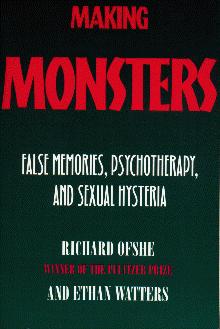
Thorough, serious and detailed. There is good experimental evidence to show that false memories can be implanted with much greater ease than I had previously imagined. There is also clear evidence that when children have been asked to reproduce information or stories, what they write or say at the time will often be highly distorted or elaborated if they are asked to repeat it some weeks later.
Steven Rose
New York Times Book Review
The descriptions [the] authors give of the "therapeutic" practices by which memories are recovered are a frightening indictment of at least some members of the burgeoning therapy industry, of its heads-I-win and tails-you-lose approach to moral rectitude, and of its capacities for self-delusion.
Anthony Storr
Washington Post Book World
Ofshe and Watters discuss the mounting evidence that hypnosis offers a potent method for inducing compelling but inaccurate pseudomemories. They also effectively criticise therapy techniques that involve visualising or imagining abusive incidents as a first step toward remembering them.
Daniel L. Schacter
Science
As the failings and excesses of recovered-memory therapy have become more widely known ... the entire field of psychotherapy is in danger of being discredited. Ofshe and Watters have written a jeremiad, calling the field to police itself before the fall of recovered-memory therapy takes legitimate psychotherapy down with it.
John. F. Kihlstrom
New England Journal of Medicine
Richard Ofshe, a Professor of Social Psychology at the University of California at Berkeley, is one of the nation's foremost authorities on tactics of coercion and a co-recipient of the 1979 Pulitzer Prize for public service reporting.
Ethan Watters, a freelance journalist, published one of the first articles on pseudomemory in the popular press.